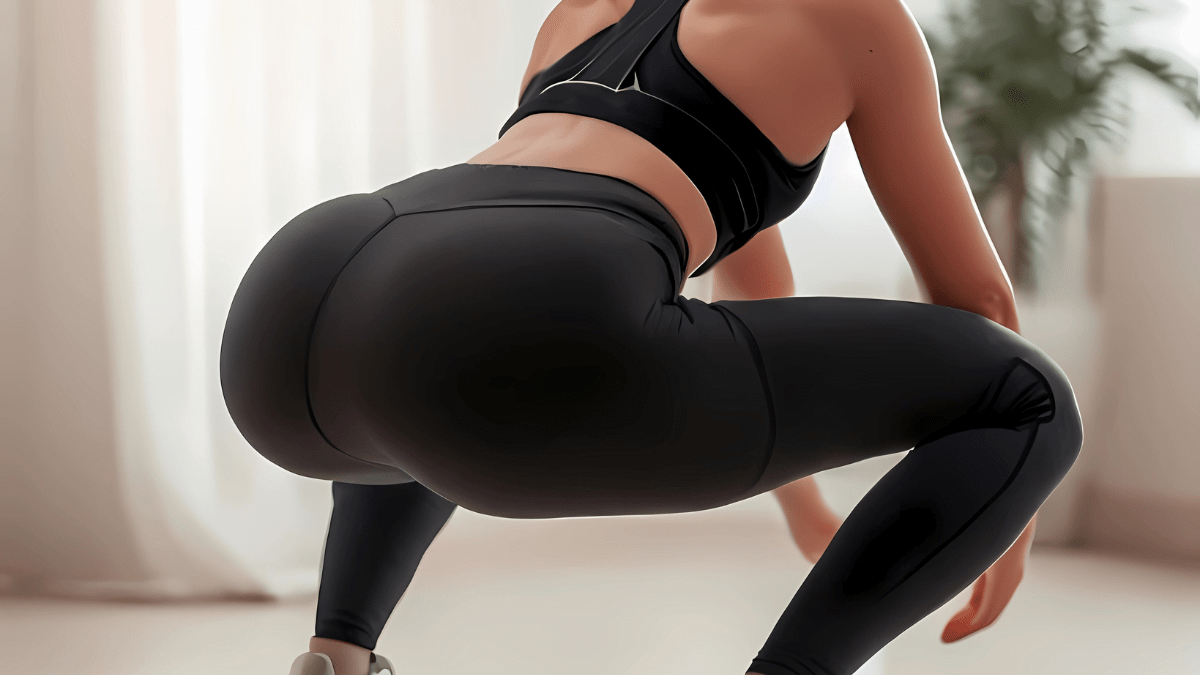Breaking News
Get a Firm Booty with These Effective 11 Lower Buttocks Workout Exercises.
Are you ready to embark on a journey towards firmer and shapelier buttocks? Do you know that working on your lower body is just as important as any other fitness routine?
The truth is that well-toned lower buttocks not only enhance your appearance but also contribute to overall strength and stability. If you’re looking to sculpt your lower buttocks, you’re in the right place.
More so, a well-rounded lower body workout regimen includes targeting the often-overlooked lower buttocks. These muscles play a crucial role in stabilizing the hips and supporting the lower back, making them essential for overall lower body strength and functionality. Whether you’re looking to enhance your curves or improve your athletic performance, incorporating lower buttocks workout into your routine is a must.
A strong, sculpted lower buttock not only enhances your physique but also contributes to better overall strength and functionality. Targeting this area with a focused lower buttocks workout routine can help you achieve the toned and powerful glutes you desire.
In this blog post, we will explore various exercises and techniques to help you sculpt and tone your lower glutes effectively. From beginner-friendly moves to advanced workouts, we’ve got you covered. So, let’s dive in and discover the secrets to a perfectly sculpted lower buttock!

Why Focus on the Lower Buttocks Workout?
When it comes to sculpting the perfect posterior, focusing on the lower buttocks is key. While many exercises work the entire gluteal region, targeted lower buttocks workout can help you achieve that coveted lifted and rounded appearance. These exercises primarily engage the gluteus maximus and gluteus minimus muscles, which play a crucial role in supporting the spine, pelvis, lower body stability, posture, and overall lower body strength. Specifically, the lower part of the gluteus maximus contributes to the roundness and firmness of your buttocks.
The Benefits of Lower Buttocks Workout.
Let’s explore some of the key benefits of incorporating lower buttocks workout into your fitness routine:
- Toned and Shapely Glutes: Lower buttocks workout specifically target the gluteus maximus, the largest muscle in your buttocks. Strengthening and toning these muscles can lead to a more defined and attractive appearance, giving your backside a lifted and rounder look.
- Improved Posture: Strong glutes play a crucial role in maintaining good posture. When your glute muscles are weak, it can lead to poor pelvic alignment and an increased risk of lower back pain. Strengthening your lower buttocks can help support your spine and promote proper posture.
- Enhanced Athletic Performance: Strong glutes are essential for various athletic activities. Whether you’re a runner, cyclist, or involved in sports like soccer or basketball, powerful glutes can improve your performance by providing better stability, speed, and agility.
- Injury Prevention: A well-balanced lower body, including strong glutes, can help prevent injuries. When your buttocks are weak, it can put extra strain on your knees and lower back, increasing the risk of injury. Lower buttocks workouts can help stabilize your joints and reduce the chances of injury.
- Functional Strength: Everyday activities like walking, climbing stairs, and lifting objects require the use of your glutes. Strengthening these muscles can make daily tasks easier and more efficient, improving your overall quality of life.
- Metabolism Boost: Lower buttocks workouts can also contribute to an increased metabolic rate. Since the gluteus maximus is a large muscle group, working it out can lead to greater calorie burn, helping you manage your weight more effectively.
- Body Symmetry: Developing your lower buttocks can create a balanced and symmetrical physique. This is important for aesthetic reasons and can also help reduce the risk of muscle imbalances that could lead to injuries.
To unlock these benefits, consider incorporating the following lower buttocks exercises into your fitness routine.

Lower Buttocks Workout Exercises.
These effective exercises target the lower buttocks. Be sure to maintain proper form and gradually increase the intensity and resistance of your workouts to continue seeing progress.
Squats: The Foundation
Squats are the cornerstone of any lower buttocks workout. This compound exercise engages not only your lower glutes but also your quads, hamstrings, and core. To perform squats effectively, stand with your feet shoulder-width apart, lower your body by bending your knees, and push your hips back as if you’re sitting in an imaginary chair. Ensure your knees don’t go beyond your toes. Squats are a fantastic way to build strength and endurance in your lower buttocks.
Lunges: Targeted Toning
Lunges are another excellent exercise to isolate and target your lower glutes. Step forward with one leg and lower your body until both knees are bent at a 90-degree angle. Push back up to the starting position. Repeat this movement with both legs. Lunges provide an effective way to sculpt your lower buttocks while enhancing stability and balance.
Glute Bridges: Isolation at Its Best
Glute bridges specifically target the gluteus maximus, helping you achieve a firmer lower butt. Lie on your back with your knees bent and feet flat on the ground. Lift your hips toward the ceiling while squeezing your glutes at the top. Lower your hips back down and repeat. Glute bridges are perfect for activating and strengthening your lower glutes.
Deadlifts: Power and Strength
Deadlifts are a powerful compound exercise that engages your entire posterior chain, including the lower glutes. Stand with a barbell in front of you, bend at your hips and knees to grasp the bar, and then lift it while keeping your back straight. Deadlift not only builds lower glute strength but also contributes to overall lower body power.
Bulgarian Split Squats: Advanced Targeting
For those seeking an advanced challenge, Bulgarian split squats are an excellent choice. Stand a few feet away from a bench or elevated surface. Place one foot on the bench behind you and perform a squat with your other leg. This exercise places intense focus on your lower buttocks and is ideal for those looking to take their lower body workout to the next level.

11 Lower Buttocks Workout Routine.
Before diving into your lower buttocks workout, it’s essential to warm up your body to prevent injuries and optimize your performance. Spend 5-10 minutes doing light cardio, such as jogging in place or jumping jacks, followed by dynamic stretches like leg swings and hip circles.
1. Glute Bridges:
- Lie on your back with your knees bent and feet hip-width apart.
- Place your arms at your sides, palms facing down.
- Lift your hips off the ground, pushing through your heels, and squeeze your glutes at the top.
- Hold for a second, then lower your hips back down.
- Perform 3 sets of 15-20 reps.
2. Donkey Kicks:
- Get down on all fours with your hands directly under your shoulders and knees under your hips.
- Keep your knee bent at a 90-degree angle.
- Lift one leg and push it upward toward the ceiling, keeping the knee bent.
- Squeeze your glutes at the top of the movement.
- Lower the leg but do not touch the ground before completing the set.
- Perform 3 sets of 15-20 reps for each leg.
3. Bulgarian Split Squats:
- Stand facing away from a bench or elevated surface.
- Place one foot behind you on the bench and the other foot about a stride’s length in front.
- Lower your body by bending the front knee until your thigh is parallel to the ground.
- Push through your front heel to return to the starting position.
- Perform 3 sets of 12-15 reps for each leg.
4. Sumo Squats:
- Stand with your feet wider than shoulder-width apart and toes pointing slightly outward.
- Keep your back straight, chest up, and core engaged.
- Lower your body by bending your knees and pushing your hips back, like sitting in a chair.
- Go as low as your flexibility allows while keeping good form.
- Push through your heels to return to the starting position.
- Perform 3 sets of 12-15 reps.
5. Step-Ups:
- Find a sturdy step or bench.
- Step onto the bench with one foot, driving through the heel, and bring the other foot up.
- Step back down with the same foot and repeat for the desired number of reps.
- Perform 3 sets of 12-15 reps for each leg.
6. Deadlifts:
- You can use dumbbells or a barbell for this exercise.
- Stand with your feet hip-width apart, holding the weights in front of your thighs.
- Hinge at your hips, keeping your back straight, and lower the weights towards the ground.
- Push your hips forward and stand back up.
- Perform 3 sets of 12-15 reps.

7. Romanian Deadlifts:
- Hold a barbell or dumbbells in front of your thighs with an overhand grip, feet hip-width apart.
- Keeping your back straight and shoulders back, hinge at the hips, lowering the weights toward the ground while maintaining a slight bend in your knees.
- Lower the weights as far as your flexibility allows, feeling a stretch in your hamstrings.
- Push your hips forward and return to the starting position.
- Perform 3 sets of 12-15 reps.
8. Hip Thrusts:
- Sit on the floor with your upper back against a bench or a sturdy surface.
- Place a barbell or weight plate on your hips or use body weight if you’re just starting.
- Roll the barbell or weight plate up your thighs to your hips.
- Bend your knees at a 90-degree angle, feet flat on the floor.
- Push your hips upward, squeezing your glutes at the top.
- Lower your hips back down and repeat.
- Perform 3 sets of 12-15 reps.
9. Bulgarian Split Squat Jumps:
- Perform the Bulgarian split squat as mentioned earlier but add an explosive jump as you rise up.
- Switch legs in mid-air and land softly on the opposite foot.
- This exercise adds an element of plyometrics, increasing intensity and helping with power development.
- Perform 3 sets of 10-12 reps for each leg.
10. Cable Kickbacks:
- Attach an ankle strap to a low cable machine.
- Strap the ankle strap to your ankle and stand facing the machine.
- Hold onto the machine for support.
- With a straight leg, lift your leg backward and upward as far as comfortable.
- Squeeze your glutes at the top of the movement.
- Lower your leg and repeat.
- Perform 3 sets of 12-15 reps for each leg.
11. Standing Calf Raises:
- Find a calf raise machine or use a Smith machine or a step.
- Stand with your feet hip-width apart and your toes pointing forward.
- Lift your heels as high as possible, flexing your calf muscles.
- Lower your heels back down, feeling a stretch in your calf muscles.
- Perform 3 sets of 15-20 reps.

Incorporate the above exercises into your lower buttocks workout routine to target your glutes from different angles and challenge them in various ways. Remember to maintain proper form throughout each exercise to maximize effectiveness and minimize the risk of injury.
You should gradually increase the intensity and allow for adequate rest and recovery between workouts. Adjust the number of sets and repetitions based on your fitness level and goals. Additionally, it’s essential to combine this workout with a balanced diet and overall fitness routine for the best results.
Conclusion: Unleash Your Glute Potential!
Following the above lower buttocks workout exercises will put you on the exhilarating journey to achieving the toned and sculpted glutes you’ve always dreamed of. But this isn’t just a workout routine; it’s a thrilling adventure towards unlocking your full glute potential.
Picture yourself striding with confidence, turning heads wherever you go, and feeling the power and grace that a strong lower body brings. This isn’t just about aesthetics; it’s about embracing your strength and radiating that inner vitality.
Remember, Rome wasn’t built in a day, and neither are perfectly toned glutes. But with these exercises as your trusty companions, your journey will be a thrilling one. Consistency is your compass, determination your fuel, and these exercises, your secret weapon.
So, lace up those workout shoes, crank up your favorite playlist, and let the sweat flow. You’re not just sculpting your lower buttocks; you’re sculpting a bolder, more confident you. It’s time to unleash your glute potential and conquer the world — one squat at a time!
Embrace the journey, savor the progress, and relish the confidence that comes with having strong, toned lower buttocks. Your adventure awaits!

FAQs
Q: Can I do these exercises at home without any equipment?
A: Yes, you can! Most of these exercises can be performed using your body weight, making them perfect for home workouts.
Q: How often should I do the lower buttocks workout?
A: You should aim for at least three times a week, allowing your muscles to recover in between sessions.
Q: When will I start seeing results?
A: Visible results may vary, but with consistency, you can expect to notice improvements within a few weeks.
Q: Are there any safety tips for these exercises?
A: Always maintain proper form, start with lower weights or resistance, and consult a fitness professional if you’re new to these workouts.
Q: Can I combine this workout with cardio for better results?
A: Absolutely! Cardio can complement your lower buttocks workout by helping burn fat and revealing your toned muscles.
Q: Are there any dietary recommendations to enhance results?
A: A balanced diet rich in lean protein, fruits, and vegetables can aid muscle recovery and growth.
Q: Is it normal to feel soreness after a lower buttocks workout, and how can I alleviate it?
A: Yes, it’s common to experience muscle soreness, known as delayed onset muscle soreness (DOMS), especially if you’re new to these exercises. To alleviate soreness, try gentle stretching, foam rolling, and rest. Adequate hydration and proper nutrition can also help with recovery.
Q: Are there variations or modifications for these exercises if I have mobility issues or injuries?
A: Yes, there are alternatives for individuals with mobility issues or injuries. Consult with a physical therapist or fitness professional for personalized modifications that suit your needs. For example, chair squats, wall sits, or seated leg lifts can be adapted for reduced mobility.
Q: How can I progress in my lower buttocks workout to continue seeing improvements?
A: To keep challenging your muscles and seeing progress, you can increase the weight, resistance, or repetitions over time. Additionally, consider incorporating different variations of these exercises, such as adding resistance bands or trying advanced versions like single-leg squats.
Q: Can genetics play a role in the development of lower buttocks?
A: Genetics can influence your body’s natural shape and muscle distribution to some extent. However, a consistent workout routine, along with a balanced diet, can help you maximize your genetic potential and achieve a toned lower buttock regardless of your genetic predisposition.
Q: Is it safe to perform these exercises during pregnancy?
A: While some of these exercises can be adapted for pregnant individuals, it’s crucial to consult with a healthcare provider or prenatal fitness specialist before starting or continuing any workout routine during pregnancy. Safety and the specific needs of everyone should be a priority.
Q: Can men benefit from the lower buttocks workout?
A: Absolutely! Lower buttocks exercises are not gender specific. Men can benefit from these workouts to strengthen their glutes, improve overall lower body strength, and enhance their physique.
Q: Should I warm up before starting these exercises, and if so, what’s an effective warm-up routine?
A: Yes, warming up is essential to prevent injury and improve performance. A dynamic warm-up that includes light cardio (e.g., jumping jacks or jogging in place) and mobility exercises (e.g., leg swings or hip circles) for about 5-10 minutes is recommended before beginning your lower buttocks workout.
Q: How can I measure my progress in my lower buttocks workout?
A: Tracking your progress is vital for staying motivated. You can measure your progress by taking photos, recording your workout statistics (weights, reps, sets), and monitoring changes in how your clothes fit over time. Remember that progress can be gradual, so be patient with yourself.




















